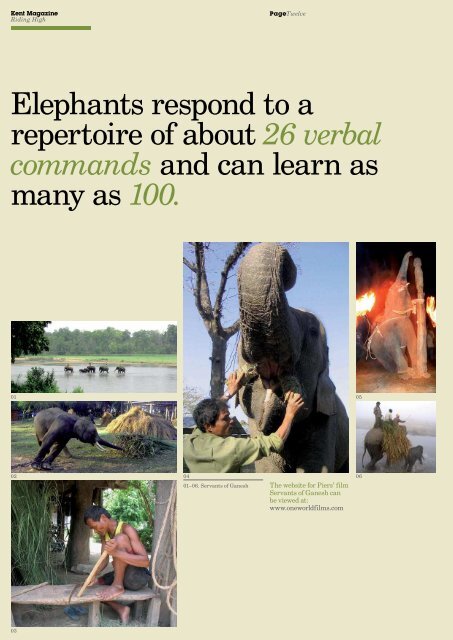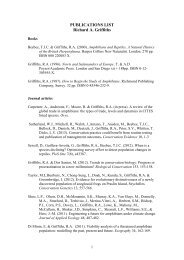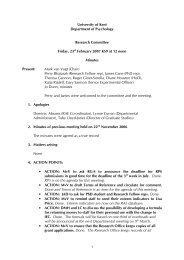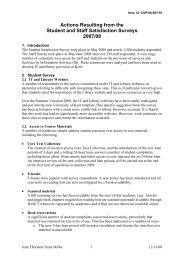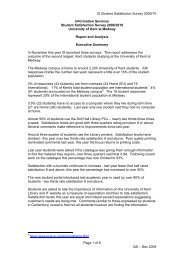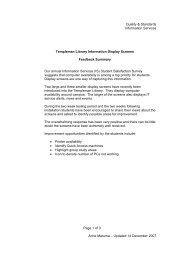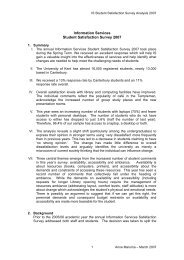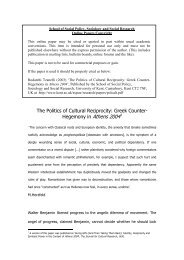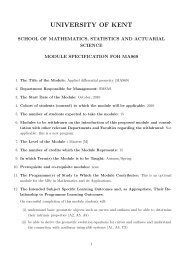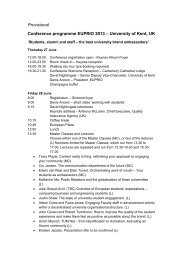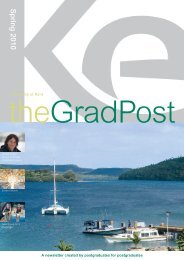The Magazine for the University of Kent
The Magazine for the University of Kent
The Magazine for the University of Kent
You also want an ePaper? Increase the reach of your titles
YUMPU automatically turns print PDFs into web optimized ePapers that Google loves.
<strong>Kent</strong> <strong>Magazine</strong><br />
Riding High<br />
PageTwelve<br />
<strong>Kent</strong> <strong>Magazine</strong><br />
Riding High<br />
PageThirteen<br />
Elephants respond to a<br />
repertoire <strong>of</strong> about 26 verbal<br />
commands and can learn as<br />
many as 100.<br />
01<br />
02<br />
04<br />
01–06. Servants <strong>of</strong> Ganesh<br />
<strong>The</strong> website <strong>for</strong> Piers’ film<br />
Servants <strong>of</strong> Ganesh can<br />
be viewed at:<br />
www.oneworldfilms.com<br />
05<br />
06<br />
He arrived during<br />
Nepal’s Maoist<br />
insurgency, when many<br />
parts <strong>of</strong> <strong>the</strong> country were<br />
under <strong>the</strong> rebels’ control,<br />
though it didn’t affect<br />
his daily life. ‘As far as<br />
my work was concerned,<br />
<strong>the</strong> insurgency was just<br />
a sort <strong>of</strong> irritation and<br />
hindrance,’ he says.<br />
‘I didn’t see any violence.<br />
<strong>The</strong> Maoists ignored me<br />
because I spoke Nepali,<br />
and in any case <strong>the</strong>y were<br />
renowned <strong>for</strong> being polite<br />
to tourists.’<br />
<strong>The</strong> elephant handlers<br />
<strong>the</strong>mselves are traditionally<br />
from <strong>the</strong> Tharu<br />
people, a low status caste,<br />
and are treated with<br />
disrespect by members<br />
<strong>of</strong> higher castes. <strong>The</strong>y<br />
are understandably wary<br />
<strong>of</strong> outsiders. However,<br />
once Piers had made his<br />
intentions clear, he was<br />
<strong>of</strong>fered an unusual way <strong>of</strong><br />
doing his research. ‘<strong>The</strong>y<br />
said that if I wanted to<br />
learn about <strong>the</strong>ir lives, <strong>the</strong><br />
only way was to learn to<br />
become an elephant<br />
handler myself. It made<br />
sense. We all know how<br />
to ride a bicycle, but if<br />
we try to explain how to<br />
do it in words, it’s very<br />
difficult. It’s <strong>the</strong> same<br />
with riding an elephant.’<br />
<strong>The</strong> chief elephant<br />
handler gave permission<br />
<strong>for</strong> Piers to work with<br />
<strong>the</strong> team and learn how<br />
to drive elephants.<br />
He gave Piers a female<br />
elephant with which to<br />
work, named Sitasma<br />
Kali. Slowly, over <strong>the</strong><br />
next couple <strong>of</strong> months,<br />
Piers built a rapport<br />
with <strong>the</strong> handlers and<br />
<strong>the</strong> elephants. He already<br />
had a working knowledge<br />
<strong>of</strong> <strong>the</strong> Nepali language,<br />
which was also <strong>the</strong> second<br />
language <strong>for</strong> <strong>the</strong> o<strong>the</strong>r<br />
handlers. Working as<br />
an apprentice elephant<br />
handler soon gave Piers<br />
important insights into<br />
<strong>the</strong>ir work.<br />
‘By personally working<br />
with an elephant,<br />
I realised <strong>the</strong>re was a<br />
relationship <strong>of</strong> trust<br />
between elephant and<br />
handler,’ he says. ‘For<br />
instance, elephants have<br />
bad eyesight and <strong>the</strong>y<br />
recognise you by smell.<br />
So every day I’d go and<br />
say “Good morning”,<br />
and Sitasma Kali would<br />
put her trunk all over<br />
me, in such a way that, if<br />
she wanted to, she could<br />
have at any time picked<br />
me up, thrown me down<br />
and broken me. <strong>The</strong>re<br />
have been occasions<br />
when that has happened<br />
to people. This greeting<br />
was all part <strong>of</strong> developing<br />
a real connection, a real<br />
relationship with<br />
<strong>the</strong> animals.’<br />
Piers’ field research lasted<br />
<strong>for</strong> a year and a half and<br />
he was based with <strong>the</strong><br />
elephant handlers <strong>for</strong> nine<br />
months. He found that<br />
elephants respond to a<br />
repertoire <strong>of</strong> about 26<br />
verbal commands and<br />
can learn as many as 100.<br />
However, most <strong>of</strong> <strong>the</strong><br />
basic commands are<br />
communicated by <strong>the</strong><br />
handlers using <strong>the</strong>ir feet<br />
to apply pressure behind<br />
<strong>the</strong> elephant’s ears in<br />
different ways.<br />
Elephants are crucial<br />
to <strong>the</strong> Nepali economy<br />
<strong>for</strong> <strong>the</strong>ir role in<br />
environmental tourism,<br />
as <strong>the</strong>y are used to carry<br />
tourists on elephantback<br />
safaris to see o<strong>the</strong>r<br />
wildlife. However, most<br />
<strong>of</strong> <strong>the</strong> key work <strong>for</strong> <strong>the</strong><br />
elephants and handlers<br />
is patrolling Nepal’s Royal<br />
Chitwan National Park<br />
and preventing poaching.<br />
<strong>The</strong>y are also used <strong>for</strong><br />
carrying out census work<br />
on o<strong>the</strong>r species, such as<br />
rhinos and tigers.<br />
Elephants have also<br />
been used to capture<br />
rhinos in Chitwan by<br />
surrounding <strong>the</strong>m with a<br />
herd numbering up to 100.<br />
<strong>The</strong>n <strong>the</strong> rhinos can be<br />
captured and translocated<br />
to o<strong>the</strong>r national parks<br />
where <strong>the</strong>y have become<br />
extinct. Piers didn’t<br />
experience rhino capture<br />
first-hand but he did<br />
get to chase a rhino on<br />
elephant back. ‘We were<br />
called in by some villagers<br />
because some rhinos were<br />
going too close to <strong>the</strong>ir<br />
fields,’ he remembers.<br />
‘So we were asked to<br />
chase <strong>the</strong>m back into<br />
<strong>the</strong> jungle. It was<br />
tremendous fun. Chasing<br />
rhino is one <strong>of</strong> <strong>the</strong> most<br />
exciting elephant rides<br />
you can have.’<br />
After nine months in<br />
<strong>the</strong> field, Piers returned<br />
to <strong>Kent</strong> to write up his<br />
PhD <strong>the</strong>sis. He submitted<br />
it at <strong>the</strong> end <strong>of</strong> 2006, five<br />
years after first<br />
embarking on his study.<br />
Academic work on this<br />
subject is extremely rare.<br />
‘As far as I’m aware,<br />
mine is <strong>the</strong> first social<br />
anthropological study<br />
<strong>of</strong> elephant handlers,<br />
<strong>the</strong> first research by<br />
participant observation,’<br />
he says. ‘I’m very<br />
surprised that nobody else<br />
has done it, as I think it’s<br />
a really interesting topic.’<br />
It has been a long journey,<br />
and it’s one that continues<br />
today. Piers is working<br />
on new applications <strong>for</strong><br />
fur<strong>the</strong>r research and<br />
developing his relationships<br />
with organisations<br />
involved with captive<br />
elephant management<br />
and elephant handlers.<br />
I didn’t want to just<br />
get a PhD out <strong>of</strong> my<br />
experiences,’ he says.<br />
‘I felt I acquired an<br />
obligation. At <strong>the</strong> end<br />
<strong>of</strong> my field work,<br />
I thanked <strong>the</strong> handlers<br />
<strong>for</strong> letting me into <strong>the</strong>ir<br />
world and sharing <strong>the</strong>ir<br />
lives with me.<br />
‘My main mission now<br />
is to make sure I can<br />
do something <strong>for</strong> <strong>the</strong>m,<br />
as I don’t think <strong>the</strong>y get<br />
<strong>the</strong> respect <strong>the</strong>y deserve.<br />
<strong>The</strong>y’re knowledgeable<br />
pr<strong>of</strong>essionals and you<br />
can’t run <strong>the</strong> national<br />
park without <strong>the</strong>m, yet<br />
<strong>the</strong>y are at <strong>the</strong> bottom<br />
<strong>of</strong> <strong>the</strong> pile.’<br />
During his time in Nepal,<br />
Piers was temporarily<br />
joined by his friend and<br />
colleague Mark Dugas<br />
and toge<strong>the</strong>r <strong>the</strong>y shot<br />
a documentary film titled<br />
Servants <strong>of</strong> Ganesh.<br />
Named after <strong>the</strong> elephan<strong>the</strong>aded<br />
Hindu god, it<br />
has been used in Piers’<br />
teaching work and has<br />
attracted interest from<br />
distributors.<br />
Piers is currently<br />
chasing <strong>the</strong> possibility<br />
<strong>of</strong> a television broadcast.<br />
He has also successfully<br />
mounted an exhibition<br />
<strong>of</strong> photographs taken<br />
while in Nepal. Elevating<br />
<strong>the</strong> status <strong>of</strong> elephant<br />
handlers in Nepal won’t<br />
be an easy task, but it’s a<br />
cause that Piers is proud<br />
to champion. ‘It’s not my<br />
job to trans<strong>for</strong>m society,’<br />
he says, ‘but I would like<br />
to make a contribution<br />
to management plans<br />
with regard to training<br />
practices and recruitment<br />
<strong>of</strong> elephant handlers, and<br />
I’d like to do something<br />
to improve <strong>the</strong> welfare<br />
<strong>of</strong> <strong>the</strong> handlers.’<br />
Piers feels that his<br />
experience in Nepal has<br />
had a pr<strong>of</strong>ound impact<br />
on his life, and while he<br />
will move on to o<strong>the</strong>r<br />
anthropological work,<br />
this project remains <strong>the</strong><br />
most important to him.<br />
‘It has shaped my sense<br />
<strong>of</strong> identity,’ he says. ‘I<br />
found field work a really<br />
liberating experience<br />
because <strong>the</strong>re was no<br />
longer any distinction<br />
between <strong>the</strong> private and<br />
pr<strong>of</strong>essional, between<br />
work and play.<br />
‘Field work isn’t about<br />
going to a place; it’s a state<br />
<strong>of</strong> mind. It was all work,<br />
it was all life, and I really<br />
enjoyed that. It was a<br />
total experience. Being<br />
an anthropologist and<br />
being one who learned to<br />
ride elephants has become<br />
fundamental to who I am.’<br />
David Clark R82<br />
interviewed Piers Locke.<br />
David is a senior features<br />
writer <strong>for</strong> IPC Media.<br />
03


